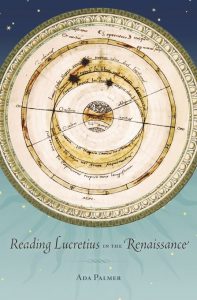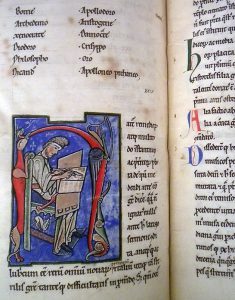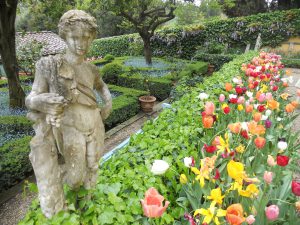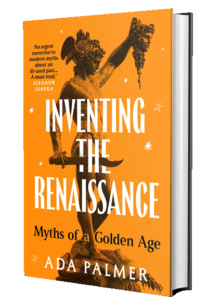I have taught courses on the Renaissance and Reformation, on Intellectual History, Censorship and Information Control, and the Craft of History Writing. During my graduate career at Harvard, I taught sections in general surveys of Western Civilization, in specialized courses on ancient, medieval, early modern and modern intellectual history, in a course on the Italian Renaissance, and in the History Department’s tutorial program. My research interests include Renaissance Neoplatonism and Neostoicism, history of atheism, skepticism and freethought, history of atomism, history of the scientific method, history of the book and printing, history of republicanism and history of epistemology and moral philosophy. I am also interested in more general examination of how improvements in information technology accelerate historical changes.
My first monograph, entitled Reading Lucretius in the Renaissance (Harvard University Press Renaissance Studies Series) is based on my work on marginalia and paratexts in surviving manuscript and print copies of Lucretius from the fifteenth and sixteenth centuries. You can read a review of it in The Bryn Mawr Classical Review. A selection from this project was published as an article entitled “Reading Lucretius in the Renaissance,” in The Journal of the History of Ideas, vol. 73 issue 3 (July 2012), pp. 395-416. The article received the 2012 I Tatti Prize for Best Essay by a Junior Scholar.
I am on the steering committee of the University of Chicago Classics Department’s new Ph.D. Program in Transformations of the Classical Tradition, a new program to train scholars to work on post-classical Greek and Latin and the reception and transformation of classical culture after antiquity. Students in the program are encouraged to pursue dual degrees in Classics and another department, History for students working with me, while for others it may be Art History, the Committee on Social Thought, Comparative Literature, Germanic Studies, Philosophy, Political Science, Romance Languages & Literatures, the Divinity School, any area of scholarship where the re-use and transformation of materials from antiquity plays a great role, from adaptations of Roman Law to Shakespeare’s comedies. I am also one of the co-developers of the Texas A&M University Classical Transformations Group, a cluster of faculty working on similar work on the languages and cultures of ancient Greece and Rome in the Middle Ages and Renaissance, and associated with the ‘Transformationen der Antike’ (Transformations of Antiquity) research group at the Humboldt-Universität zu Berlin. I still work actively with the group even now that I am at the University of Chicago.
 Publications (selected):
Publications (selected):
- “The Use and Defense of the Classical Canon in Pomponio Leto’s Biography of Lucretius,” in Vitae Pomponianae, Biografie di Autori Antichi nell’Umanesimo Romano (Lives of Classical Writers in Fifteenth-Century Roman Humanism), proceedings of a conference hosted by the Danish Academy in Rome and the American Academy in Rome, April 24th 2013, Renaessanceforum (Forum for Renaissance Studies, Universities of Aarhaus & Copenhagen; Read online).
- “T. Lucretius Carus, Addenda et Corrigenda,” in Catalogus Translationum et Commentariorum, vol. 10. Washington D.C.: Catholic University of America Press, 2014.
- Reading Lucretius in the Renaissance. Cambridge MA: Harvard University Press, I Tatti Renaissance Studies Series. 2014.
- “Reading Lucretius in the Renaissance,” The Journal of the History of Ideas, vol. 73, no. 3, July 2012, pp. 395-416. (Read online; Recipient of the 2013 I Tatti Prize for Best Article by a Junior Scholar.)
- The Recovery of Classical Philosophy in the Renaissance, a Brief Guide. Co-author with James Hankins. Istituto Nazionale di Studi sul Rinascimento, 2007. (More.)
- “Lux Dei: Ficino and Aquinas on the Beatific Vision,” Memini, Traveaux et documents (Société des études médiévales du Québec, Montréal) 2002, pp. 129-152. (More.)
- “The Recovery of Stoicism in the Renaissance,” in The Routledge Handbook of the Stoic Tradition, ed. John Sellars. New York: Routledge, 2016, pp. 117-132.
- “The Active and Monastic Life in Humanist Biographies of Pythagoras,” Forms and Transfers of Pythagorean Knowledge: Askesis—Religion—Science, eds. Almut-Barbara Renger & Alessandro Stavru. Harrassowitz: Wiesbaden, 2016.
- Entries “Lucretius,” “Diogenes Laertius” and “Epicureanism” in The Springer Encyclopedia of Renaissance Philosophy. New York: Springer, 2016-18.
Book Reviews
- “Can Science Justify Itself? Review of Enlightenment Now: the Case for Reason, Science, Humanism, and Progress, Steven Pinker (Viking, 2018),” Harvard Magazine, March-April 2018, 56-59.
- Review of De Rerum Natura Editio Princeps (1472-73), ed. Marco Beretta (Bologna: Bononia University Press, 2016), Renaissance Quarterly, 70 n. 4 (2017), 1475-6.
- “Lucretius after The Swerve.” Review essay focused on David Norbrook, Stephen Harrison, and Philip Hardie, eds., Lucretius and the Early Modern, Classical Presences (Oxford: Oxford University Press, 2015), and Steven Greenblatt, The Swerve: How the World Became Modern (New York: W. W. Norton, 2011), Modern Philology, vol. 115 no. 2 (2017), 289-97.
- Review of Kenneth Sheppard, Anti-Atheism in Early Modern England 1580-1720: The Atheist Answered and His Error Confuted (Brill, 2015), Renaissance Quarterly, vol. 70, n. 2 (2017), 780-82.
- Review of Christopher M. Graney, Setting Aside All Authority: Giovanni Battista Riccioli and the Science against Copernicus in the Age of Galileo (Notre Dame, Indiana: University of Notre Dame Press, 2015), The Journal of Religion, no. 3 (July 2017), 423-425.
Recent Talks and Conference Papers:
- Princeton University Committee for the Study of Books and Media: “Why We Censor, from the Inquisition to the Internet,” Nov 21, 2019.
- “The Inversion of Epicureanism in Lorenzo Valla’s De Voluptate,” at Beyond Reception: Renaissance Humanism and the Transformation of Classical Antiquity (Berlin), March 23, 2015.
- “The Influence of Spuria and Forgeries on Renaissance Neoclassicism: The Recovery of the Stoics, 1400–1664,” at the Renaissance Society of America Conference (Berlin), March 28, 2015.
- “The Moral Physics of Dante’s Cosmos” and “The Syncretic, Radical and Hybrid Christianities of Renaissance Humanists,” guest lectures for the Figures of Renaissance Reform and Renewal non-credit course, Lumen Christi institute, Chicago, Feb. 24th & March 3rd, 2015.
- “Active and Monastic Life in Humanist Biographies of Pythagoras,” Western Mediterranean Culture Workshop (University of Chicago), March 2nd, 2015
- “How Humanists Read a Famous Atheist: the Evolution of Renaissance Reading Methods Exposed through a Survey of Marginalia in Renaissance Copies of Lucretius, 1417-1600,” Classics Department Colloquium, University of Pennsylvania (Philadelphia), Feb. 12th 2015.
- “Hands-on Rare Books Icebreaker Session, an opportunity to touch and get used to working with antique books and manuscripts.” Early Modern Workshop, University of Chicago, Feb. 9th 2015.
- “Lucretius, Renaissance Reading Culture and the Epicurean Roots of the Scientific Method,” colloquium presentation at the Descartes Centre for the History and Philosophy of the Sciences and the Humanities, Utrecht University, Feb. 2nd 2015.
- “How Forgeries and Spuria Still Shape Our Modern Classical Canon, Examined Through the Renaissance Revival and Early Print History of Classical (and not-so-Classical) Stoicism,” Weissbourd Text Seminar, Society of Fellows in the Liberal Arts at the University of Chicago, November 12th, 2014.
- “The Transformation of Stoicism in the Renaissance,” at Renaissance and Early Modern Transformations of Antiquity. Humboldt-Universität zu Berlin, December 2nd 2014.
- “The Vernacular Lucretius,” in a panel on The Epicurean Renaissance, presented at the Sixteenth Century Society Conference, New Orleans, October 16th 2014.
- “Weak Empiricism and Provisional Belief: the influence of Lucretius and Epicurean Skepticism on Montaigne, Gassendi, Mersenne, and Scientific Thought,” presented at the Renaissance Society of America Conference, New York, March 27th 2014.
Academic Awards and Honors
- David Hoeft Award for Newly Tenured Faculty, University of Chicago, 2018
- I Tatti Prize for best essay by a junior scholar in 2012
- Selma V. Forkosch prize for the best article published in the Journal of the History of Ideas in 2012
- Texas A&M Student Led Award for Teaching Excellence, Fall 2010
- Harvard University Certificate of Distinction in Teaching, 2005, 2006, 2007
- Nominated for the Joseph R. Levenson Memorial Teaching Prize, Harvard, 2004
Fellowships and Research Grants
- American Council of Learned Societies (ACLS) Fellowship 2019-20.
- Social Sciences Division Curriculum Innovation Grant, for “Printing Press Rehabilitation,” with Timothy Harrison and Adrian Johns, 2018-19 and 19-20.
- Institute on the Formation of Knowledge Faculty Research Grant, for “Censorship, Information Control, and Information Revolutions from Printing Press to Internet,” 2018-19.
- Neubauer Collegium Grant, for “Censorship, Information Control, and Information Revolutions from Printing Press to Internet,” co-lead with Adrian Johns and Cory Doctorow, three year funded project for 2018-21.
- College Research Fellows Program, 2017-18 and 2018-19.
- Nicholson Center funds for faculty activities, 2015, 2017, and 2018.
- Institute on the Formation of Knowledge Faculty Seed Grant, for “Censorship, Information Control, and Information Revolutions from Printing Press to Internet,” 2017.

Primary Affiliations:
- University of Chicago History Department
- University of Chicago Classics Department (associate member)
- Transformations in the Classical Tradition Ph.D.
- Stevanovich Institute on the Formation of Knowledge
- Classical Transformations at Texas A&M University
Other Affiliations:
- Villa I Tatti, the Harvard University Center for Italian Renaissance Studies
- Renaissance Society of America
- International Association for Neo-Latin Studies
- Melbern G. Glasscock Center for Humanities Research
- Texas A&M University History Department
- The Early Modern Studies Group at Harvard University
- American Philological Association
- American Historical Association
- Fulbright Association
- American Association of University Women
Articles and News:
- “A Better Way of Understanding the Debate Over Free Speech on Campus”, Pacific Standard, July 17, 2019
- “Why Trump’s Decision to Intervene in Campus Speech Policies Is So Dangerous,” op-ed, Washington Post, Mar. 28, 2019.
- “Why Is Silcon Valley So Obsessed with the Virtue of Suffer?” New York Times, Mar. 26, 2019.
- “How #Article13 Is Like the Inquisition: John Milton against the EU #CopyrightDirective,” Boing Boing, Mar. 24, 2019
- December 2018: Renaissance Woman a profile in The University of Chicago’s alumni magazine
- June 2017: HOMER’S ODYSSEY THROUGH PRINT: Volume of Student Essays as Part of Graduate Colloquium
- July 2010: A&M Liberal Arts Faculty writing for Catalogus Translationum Commentariorum
- July 2010: Newspaper of Savignano Sul Rubicone (Italy) covers Dr. Palmer’s research visit

